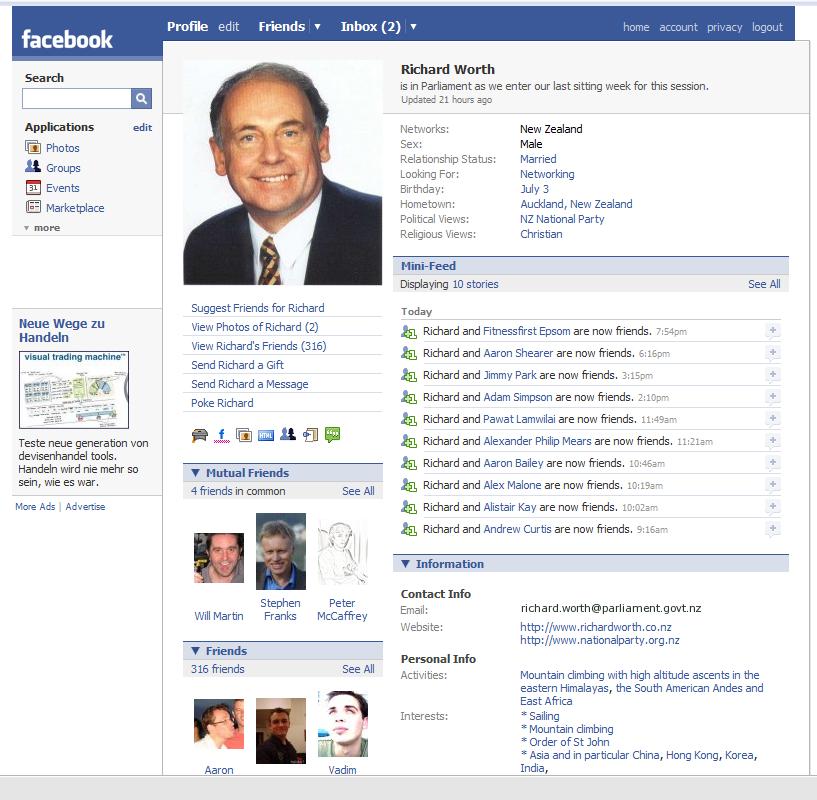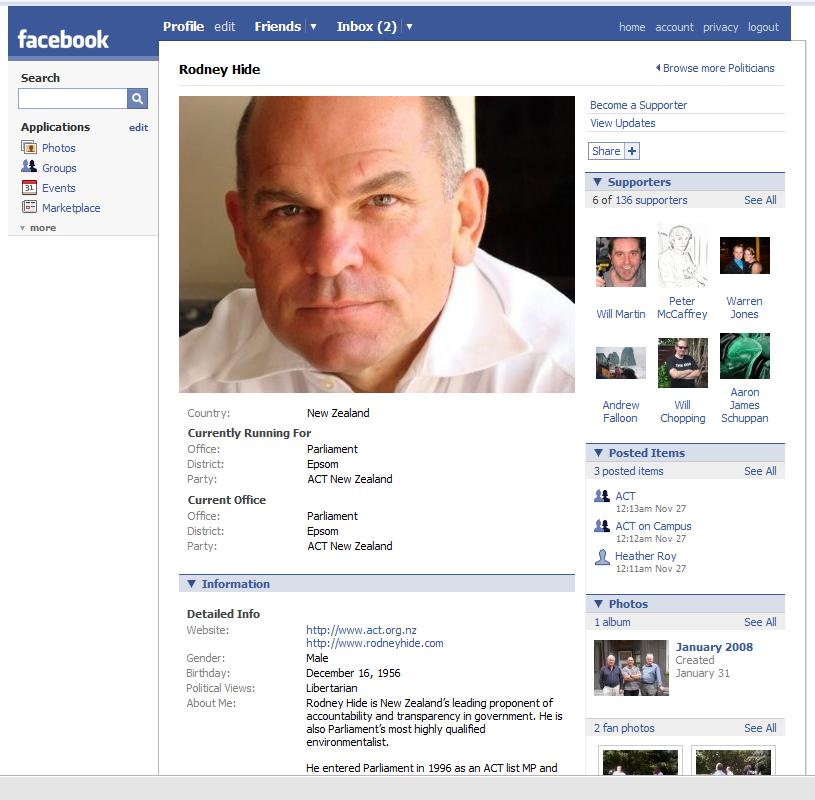Is it Worth trying to face up to Hide online?
[text-blocks id=”act-party”]
A few weeks ago an e-mail came across my inbox from Facebook. This is not remarkable in itself – even fellow occasional social networkers like me will be aware that the form e-mails advising that person XYZ “has added you as a friend” come along as regularly as the sun rises and sets.
But this time the person adding me as a friend was no-one other than Richard Worth, National’s candidate (and former Member of Parliament) in Epsom who is again standing, this time to try and unseat Rodney Hide as the local MP. My first concern was to wonder how on earth Worth came to the idea of adding me to his friends list. I soon realised that he had gone through and added anyone with connections to ACT listed on Facebook. Over the last year a number of ACT members or people linked with ACT have added me as their “friend”, so it is not hard to see how Worth came across a handy reservoir of names. It’s a good bet that a fair number of them are Epsom voters. Of course, I’m sure many people refused the invitation to be Worth’s “friend”, but seeing he is listed as now having 316 friends, I suspect many clicked accept without a second thought. (Naturally, I accepted Worth’s invitation, for research purposes mind…).
Overseas, social networking has become popular with politicans trying to get in touch with the so-called YouTube generation. Anyone who has not heard about how many Facebook friends Barack Obama has acquired, for instance, just hasn’t been listening properly. While the United States inevitably leads in such innovations, we also saw social networking play a role in the election of Kevin Rudd as Australian Prime Minister last year. Political operatives see the opportunity of reaching more “young voters” – who may consume relatively little television and print media, both of which are traditional outlets for political advertising. Doubtlessly the “two-way” potential of online networking via sites such as Facebook is also seen as an advantage (although whether it is harnessed properly is another question altogether).

Inevitably, New Zealand’s politicans have attempted to follow suit. Late last year, Rodney Hide founded his “supporters'” page on Facebook, which to this day has changed little from the brief bio and photo piece established on launch. Hide does not provide regular updates to his page and indeed he does not really seem to appreciate the nature of online networking. To note just one flaw, the third-person biography should surely be written in the first-person if the page is to avoid looking like a mere electronic brochure written by a party staffer. Given Hide’s devotion to technology (he is an addicted BlackBerry user and has been one of the few NZ politicans to regularly maintain an self-written blog, although this has been silent of late), I wonder if he intends to rectify his Facebook presence closer to the election. At the moment, it looks like his heart is not in it.
So what about Worth? His page has a number of advantages over Hide’s: it is updated regularly (seems to be daily at the moment), has a filled-out profile with Worth’s personal interests (including mountain climbing in Africa and elsewhere – I wonder if he has ever met Helen Clark along the way – who climbed Mount Kilimanjaro in 1999?) and moreover, all of this would appear to be written by Worth himself, as it is in the first person and doesn’t sound polished enough to be written by a staffer.
What is more, Worth’s profile is a fully-fledged one, meaning users can post messages on his “wall” and use all the classic Facebook features – i.e. you can “poke Richard”. Rodney Hide’s profile, by contrast, is a limited “fan” version which severely restricts the amount of possible user interaction. Worth’s openness on Facebook is to be commended.
However, while all this sounds fine in theory, in practice Richard Worth on Facebook is well, a little dull. The profile photograph is hardly “Yes We Can” material; clicking through to see the other Flickr photographs Worth has uploaded is an effort not fully rewarded. Moreover, Worth’s daily updates resemble the programme This Week in Parliament (alas, absent from the airwaves for several years now because Radio New Zealand decided to cut its funding)
Yesterday, for instance, Worth’s “friends” could read some scintillating new information:
Business in the House this week will be the remaining stages of the Land Transport Management Amendment Bill, the Births, Deaths, Marriages, the Relationships Registration Amendment Bill and the first readings of the Judicial Matters Bill and the Public Lending Right Bill.
A little more interesting was an update from last week. Now, political parties are not normally keen to admit they are influenced by “lobbyists”. Which lobbyists were you referring to, Richard? Did the invitation to celebrate also extend to PR companies – Crosby Textor, by any chance? And what ever happened to supposed journalistic objectivity?
Last night the National Party Caucus hosted its annual party for media representatives and lobbyists. It was a long running night and doubtless some this morning will be feeling the pace of a splendid party.
I spoke in the House on changes to the law which would permit union and employer association lawyers to give advice to their members. That is controversial because it does not reflect the lawyer/client relationship.
There is some mirth provided by Worth’s lack of choosiness over his “friends”, illustrated by these comments posted on his wall:


 Of course, we should not get carried away with evaluating politicans by their Facebook pages or anything else of the virtual manner. Certainly, it’s an easy (everything needed accessible by pressing a few keys) and reasonably fun exercise to carry out. This is probably one reason that for years, political scientists and other commentators have carried out evaluations of political party websites. For example, in April 2007, the MainlyPolitics blog (run by Chris Hipkins, now the 2008 Labour candidate for the Rimutaka electorate) carried out a survey of New Zealand political party websites and from memory gave high marks to the Greens. Unfortunately the blog has now been taken down, which probably has something to do with Hipkins’s candidacy.
Of course, we should not get carried away with evaluating politicans by their Facebook pages or anything else of the virtual manner. Certainly, it’s an easy (everything needed accessible by pressing a few keys) and reasonably fun exercise to carry out. This is probably one reason that for years, political scientists and other commentators have carried out evaluations of political party websites. For example, in April 2007, the MainlyPolitics blog (run by Chris Hipkins, now the 2008 Labour candidate for the Rimutaka electorate) carried out a survey of New Zealand political party websites and from memory gave high marks to the Greens. Unfortunately the blog has now been taken down, which probably has something to do with Hipkins’s candidacy.
In these, it has been far from clear that a good website translates into higher polling results. In New Zealand, one of the most striking examples of this might well be the website of the Labour Party. For years, it put forward an offering which would make Russell Brown despair, yet it was the party in government with 40% or more support. For two years following the 2005 election the site still invited supporters to contribute to the election campaign. Now, its website gleams with bright and breezy graphics with regularly updated news brought on by a wholesale overhaul – yet as we know support for Labour has substantially declined.
Above all, we shouldn’t take a party website, blog or Facebook page to be a proxy for the actual party. A poor online presence need not necessarily mean a party has a poor offline presence. Indeed, it seems to be the case that a party will invest more time and money online when the party is performing poorly in terms of polling. To the Labour example above we can add ACT’s own site, which underwent a complete overhaul (although I’m not sure entirely for the better) in 2007.
With this in mind, perhaps ACT has decided that while a certain online committment is important, it is not worth spending money on virtual efforts which could be spent on campaigning on the ground.
After all, when all is said and done, Richard Worth’s provision of a daily mini-Hansard is unlikely to to power him to victory against Rodney Hide in Epsom.